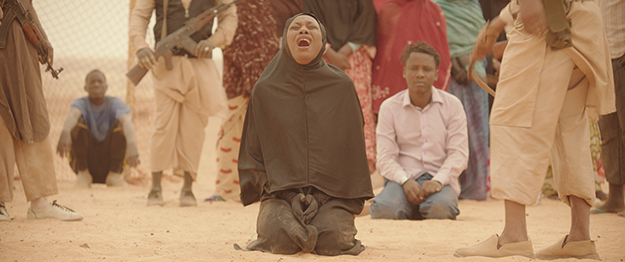Took a van trip to Filmstreams and watched with Katy’s class. Set in Mali but shot in Mauritania, Sissako continues in his style of portraying a central character conflict (a murder over a dead cow) while frequently cutting away to daily life and smaller events in the surrounding town. In this case, the daily life segments involve their own, larger conflict: an invasion of the town by militant islamists attempting to impose their own laws. Inevitably these things collide as the invaders’ court decides to execute the herder who killed a fisherman, as well as the herder’s wife and another guy who seems to have simply given her a ride.
Promo screenshots stolen from Film Comment:

Wonders and horrors abound. An adulterous couple is buried then stoned to death. A Rooster Lady does inexplicable things. The local imam engages the invaders in futile discussion. Music and soccer and smoking are outlawed and punished with whippings, though the invaders are shown to be hypocrites in many of these cases, enjoying the same past times on the sly. Sissako makes them seem absurd, and could’ve made a comedy with some of the same material (a man is ordered to shorten his pants so he removes them; a jihadist can’t get through his propaganda video), but their frequent, meaningless acts of violence maintain an air of menace. As in Bamako he stages a song as an act of rebellion.

The movie keeps returning to the doomed herder and his beautiful family. Despite the repression and crime of the jihadists, it’s the herder Kidane’s murder of a fisherman who killed his prize cow which is shot as a cosmic event, ending with surely the greatest wide shot of the year as Kidane runs across the waist-deep water leaving a trail of silt, the mortally wounded fisherman struggling to his feet on the other side.
Cinematographer Sofian El Fani shot Blue is the Warmest Color, which had a very different look. The only actor I think I’ve seen before is Fatoumata Diawara, a star of Genesis, as the lashed singer pictured above.
G. Kenny:
The really killing thing about all the conflict that tears this place and its people apart is how calm everyone is about it. Nobody raises his or her voices; nobody raises a hand in impulsive anger. Violence, when it occurs, is done in a very deliberate way. The jihadists need to conduct themselves “properly,” as this conveys their rectitude. But their stance only barely disguises their old-fashioned bullying. The treatment of women in particular is just misogyny with unconvincing window dressing. The jihadist who wants the young woman in marriage expects no argument; the girl is his right. And the fact that he asks for her politely, in the logic he lays out, only underscores his alleged right. It doesn’t matter anyway; if he is refused, he calmly states, “I’ll come again in a bad way.”
Peter Labuza on The Film Stage:
There is a critique here, and it is the failure of jidhadism as a cultural translator. This comes in literal form, as numerous scenes feature the jihadis having to work through translators to make their demands. … Numerous sequences feature characters simply trying to explain their point of view to one another, but the sides clearly aren’t listening. When one man confesses his deepest and most personal want to the jihadi leader, the leader asks his translator to stop. He knows that in order to continue his fight, he cannot listen. These jihadis only see prey.